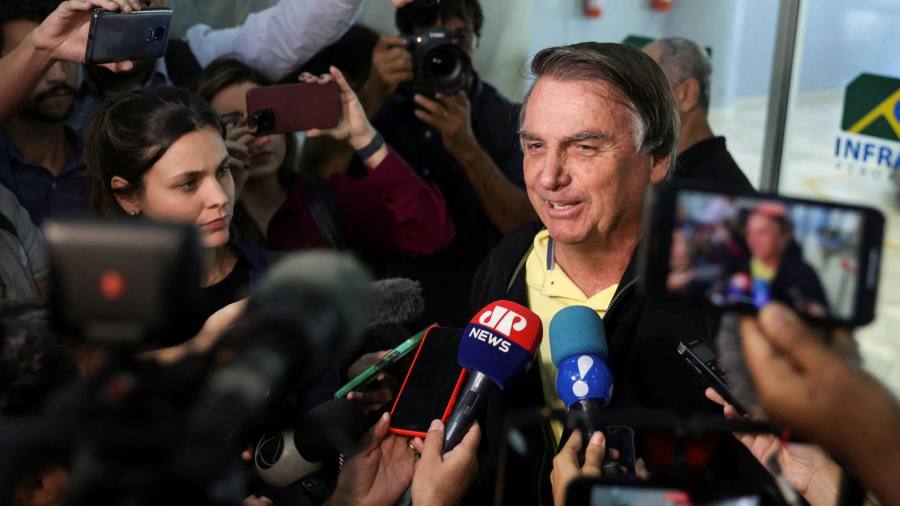Receive free Brazilian politics updates
We’ll send you a myFT Daily Digest email rounding up the latest Brazilian politics news every morning.
Brazil’s top electoral court on Friday voted to ban former president Jair Bolsonaro from running for political office until 2030, all but ending the rightwing populist’s hopes of a quick political comeback.
A majority of the seven judges on the Superior Electoral Court voted in favour of convicting the 68-year old former army captain of abuse of political power and misuse of media ahead of last year’s presidential election, which he narrowly lost to leftist Luiz Inácio Lula da Silva.
The conviction of Bolsonaro, who served one tumultuous term between 2019 and last year, paves the way for the emergence of new leaders on the Brazilian right, which — despite success in congressional elections last year — has been lacklustre in opposition.
Leftwing politicians hailed the court’s decision as “historic” and a victory for the rule of law, while the populist leader’s supporters sought to put a brave face on the verdict. Ciro Nogueira, a senator who served as Bolsonaro’s chief of staff, said “hope was more alive than ever.”
The trial at the electoral court focused on whether Bolsonaro had committed an abuse of political power and misuse of the media when he hosted foreign ambassadors in July last year to air doubts about the reliability of the nation’s electronic voting machines.
Opponents said the meeting was a ploy to fuel distrust in the integrity of the elections that Bolsonaro went on to lose. It was broadcast on live TV as well as social networks YouTube, Instagram and Facebook.
Benedito Gonçalves, the judge who co-ordinated the case, said Bolsonaro had “delivered a deceitful monologue about electronic voting and the electoral justice system . . . using scraps of false information already so naturalised in his rhetoric”.
The court also accepted into evidence a draft document found in January in the home of Bolsonaro’s justice minister, Anderson Torres, that outlined steps to overturn the result of the election. The court said the document showed a broader strategy to cast doubt on the electoral system.
Bolsonaro had denied any wrongdoing, claiming that the meeting with ambassadors was for governmental, not electoral, purposes.
“I did not attack the voting system. I just showed its possible flaws,” said Bolsonaro, who plans to appeal against the verdict at the supreme court.
The eight-year ban, which runs retroactively from the first round of last year’s election in October, means Bolsonaro will be barred from contesting any polls — local, state or federal — until 2030. He is, however, allowed to remain politically active and the former president said he wanted to stay “100 per cent” engaged.
A conservative nationalist, Bolsonaro still enjoys broad popular support, particularly in Brazil’s rural interior states and among agricultural and evangelical Christian communities, who applaud his message of “God, family and country”.
His Liberal party has set a target of winning more than 1,000 out of a possible 5,000 mayoral races in local elections next year.
“Bolsonaro achieved something amazing — he created a movement. As a politician he disappointed the political class, but they know he can still energise supporters, give speeches, fire up the base,” said Mario Marconini, managing director of Teneo in Brazil.
In the next presidential cycle, many expect Bolsonaro’s mantle to be passed to either Tarcísio de Freitas, the governor of São Paulo state, or Romeu Zema, the governor of the large southeastern state of Minas Gerais.
A former infrastructure minister of Bolsonaro, de Freitas is seen as technocratic but lacking the common touch. Zema, a former successful businessman, is considered a savvier political operator but as yet does not have broad national recognition.
Bolsonaro’s wife, Michelle, has also been suggested as a potential contender, although the former president has highlighted her lack of political experience.
Despite his political potency, Bolsonaro has been marginalised from the mainstream since his election defeat in October and the subsequent vandalisation of the country’s political institutions by his supporters in January. He faces a criminal investigation into whether he incited the rioters.
He is also being investigated by police for the alleged falsification of Covid-19 vaccine records and for potential corruption after he received two sets of jewellery that were reportedly presented as gifts from the Saudi government when he was president.
Read the full article here




